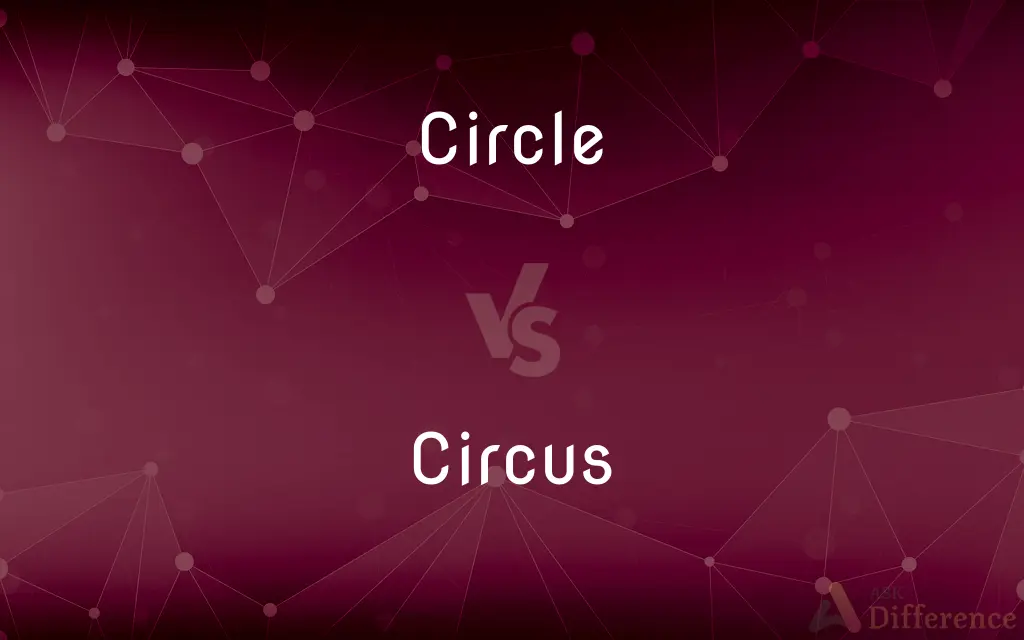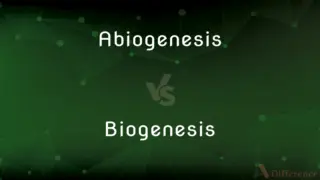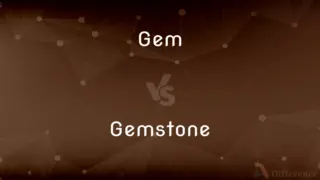Circle vs. Circus — What's the Difference?
By Urooj Arif & Fiza Rafique — Updated on April 6, 2024
A circle is a simple closed shape with all points equidistant from the center, used in geometry and everyday life, while a circus refers to a traveling company of performers that may include acrobats, clowns, and animals, entertaining with various acts.

Difference Between Circle and Circus
Table of Contents
ADVERTISEMENT
Key Differences
A circle, in geometric terms, is a plane figure contained by one line, called the circumference, such that all points on the line are equally distant from a common center. This concept is foundational in mathematics and is applied in various scientific and practical contexts, such as designing wheels or planning circular plots of land. On the other hand, a circus is an entertainment venue or traveling show famous for its diverse array of performances, including acrobatics, trained animals, clowns, and other novelty acts, originating in the late 18th century.
While a circle is defined by its simplicity and mathematical properties, a circus is characterized by its complexity and the variety of its performances. The circle's significance lies in its perfection and symmetry, making it a subject of fascination in mathematics, art, and philosophy. Conversely, the circus is celebrated for its ability to amaze and entertain, offering a spectacle of skills, humor, and daring feats.
The term "circle" can also metaphorically refer to a group of people with a shared interest or purpose, indicating unity and equality among its members, as in a "circle of friends." In contrast, "circus" can denote a situation of chaotic activity and disorder, as in "media circus," highlighting the word's versatility outside its literal meaning.
In practical applications, circles are seen in objects and designs, from simple tools like compasses to sophisticated technological applications like roundabouts to manage traffic flow. Circuses, however, contribute to cultural and social life, often traveling from place to place to bring entertainment to various communities, embodying a sense of adventure and nostalgia.
The distinction between a circle and a circus extends beyond their definitions to reflect their roles in human thought and culture. One symbolizes geometric perfection and unity, while the other represents entertainment, skill, and the joy of performance.
ADVERTISEMENT
Comparison Chart
Definition
A plane figure with all points on the circumference equidistant from the center.
A traveling company of performers showcasing acrobatics, animals, and clowns.
Significance
Represents mathematical perfection and symmetry.
Represents entertainment, skill, and cultural tradition.
Applications
Found in geometry, design, and everyday objects.
Entertainment industry, cultural and social events.
Metaphorical Use
Can denote unity or a group with a shared purpose.
Can denote chaos or a situation with overwhelming activity.
Compare with Definitions
Circle
Symbolizes infinity, unity, and perfection.
The circle of life is a common metaphor in literature.
Circus
Can imply a chaotic or lively situation.
The school carnival turned into a bit of a circus.
Circle
Represents groups with shared interests.
Our book club is a tight-knit circle.
Circus
A traveling show with performers and animals.
We went to the circus to see the acrobats.
Circle
A perfectly round shape with all points the same distance from the center.
The artist drew a perfect circle.
Circus
Originated as a public entertainment venue in ancient Rome.
The Circus Maximus was famous for chariot races.
Circle
Basis for many mathematical formulas.
The area of a circle is πr².
Circus
Known for its entertaining and diverse acts.
The circus clown had everyone laughing.
Circle
Found in nature and technology, like bubbles and wheels.
Wheels are designed as circles for smooth rotation.
Circus
A cultural tradition bringing joy and wonder.
The circus brings a sense of nostalgia and excitement.
Circle
A circle is a shape consisting of all points in a plane that are at a given distance from a given point, the centre; equivalently it is the curve traced out by a point that moves in a plane so that its distance from a given point is constant. The distance between any point of the circle and the centre is called the radius.
Circus
A circus is a company of performers who put on diverse entertainment shows that may include clowns, acrobats, trained animals, trapeze acts, musicians, dancers, hoopers, tightrope walkers, jugglers, magicians, unicyclists, as well as other object manipulation and stunt-oriented artists. The term circus also describes the performance which has followed various formats through its 250-year modern history.
Circle
A round plane figure whose boundary (the circumference) consists of points equidistant from a fixed point (the centre)
Draw a circle with a compass
Circus
A travelling company of acrobats, clowns, and other entertainers which gives performances, typically in a large tent, in a series of different places
A circus elephant
I was thrilled by the annual visits of the circus
Circle
A group of people with a shared profession, interests, or acquaintances
She did not normally move in such exalted circles
Circus
(in ancient Rome) a rounded or oval arena lined with tiers of seats, used for equestrian and other sports and games
The Circus Maximus
Circle
Move all the way around (someone or something), especially more than once
They were circling Athens airport
We circled round the island
Circus
A rounded open space in a town or city where several streets converge
Piccadilly Circus
Circle
A plane curve everywhere equidistant from a given fixed point, the center.
Circus
A public entertainment consisting typically of a variety of performances by acrobats, clowns, and often trained animals.
Circle
A planar region bounded by a circle.
Circus
A traveling company that performs such entertainments.
Circle
Something, such as a ring, shaped like such a plane curve.
Circus
A circular arena, surrounded by tiers of seats and often covered by a tent, in which such shows are performed.
Circle
A circular or nearly circular course, circuit, or orbit:a satellite's circle around the earth.
Circus
A roofless oval enclosure surrounded by tiers of seats that was used in antiquity for public spectacles.
Circle
A traffic circle.
Circus
Chiefly British An open circular place where several streets intersect.
Circle
A series or process that finishes at its starting point or continuously repeats itself; a cycle.
Circus
(Informal) Something suggestive of a circus, as in frenetic activity or noisy disorder
"I was amazed at the amount of hubbub in the lobby ... it was a circus. The check-in area brought to mind a mustering station on a foundering cruise ship" (Bill Bryson).
Circle
A group of people sharing an interest, activity, or achievement:well-known in artistic circles.
Circus
A traveling company of performers that may include acrobats, clowns, trained animals, and other novelty acts, that gives shows usually in a circular tent.
The circus will be in town next week.
Circle
A territorial or administrative division, especially of a province, in some European countries.
Circus
A round open space in a town or city where multiple streets meet.
Oxford Circus in London is at the north end of Regent Street.
Circle
A sphere of influence or interest; domain.
Circus
(figurative) A spectacle; a noisy fuss; a chaotic and/or crowded place.
Circle
(Logic)A vicious circle.
Circus
(historical) In the ancient Roman Empire, a building for chariot racing.
Circle
To make or form a circle around:The hedge circles the fountain.
Circus
A code name for bomber attacks with fighter escorts in the day time. The attacks were against short-range targets with the intention of occupying enemy fighters and keeping their fighter units in the area concerned.
Circle
To move in a circle around:The ship circled the island.
Circus
(obsolete) Circuit; space; enclosure.
Circle
To move in a circle.
Circus
To take part in a circus; or to be displayed as if in a circus
Circle
(geometry) A two-dimensional geometric figure, a line, consisting of the set of all those points in a plane that are equally distant from a given point (center).
The set of all points (x, y) such that {{(x
R2}} is a circle of radius r around the point (1, 0).
Circus
A level oblong space surrounded on three sides by seats of wood, earth, or stone, rising in tiers one above another, and divided lengthwise through the middle by a barrier around which the track or course was laid out. It was used for chariot races, games, and public shows.
Circle
A two-dimensional geometric figure, a disk, consisting of the set of all those points of a plane at a distance less than or equal to a fixed distance (radius) from a given point.
Circus
A circular inclosure for the exhibition of feats of horsemanship, acrobatic displays, etc. Also, the company of performers, with their equipage.
Circle
Any shape, curve or arrangement of objects that approximates to or resembles the geometric figures.
Children, please join hands and form a circle.
Circus
Circuit; space; inclosure.
The narrow circus of my dungeon wall.
Circle
Any thin three-dimensional equivalent of the geometric figures.
Cut a circle out of that sheet of metal.
Circus
A travelling company of entertainers; including trained animals;
He ran away from home to join the circus
Circle
A curve that more or less forms part or all of a circle.
The crank moves in a circle.
Circus
Performance given by a traveling company of acrobats clowns and trained animals;
The children always love to go to the circus
Circle
A specific group of persons; especially one who shares a common interest.
Inner circle
Circle of friends
Literary circle
Circus
A frenetic disorganized (and often comic) disturbance suggestive of a circus or carnival;
It was so funny it was a circus
The whole occasion had a carnival atmosphere
Circle
The orbit of an astronomical body.
Circus
(antiquity) an open-air stadium for chariot races and gladiatorial games
Circle
(cricket) A line comprising two semicircles of 30 yards radius centred on the wickets joined by straight lines parallel to the pitch used to enforce field restrictions in a one-day match.
Circus
An arena consisting of an oval or circular area enclosed by tiers of seats and usually covered by a tent;
They used the elephants to help put up the circus
Circle
(Wicca) A ritual circle that is cast three times deosil and closes three times widdershins either in the air with a wand or literally with stones or other items used for worship.
Circus
A genus of haws comprising the harriers
Circle
A traffic circle or roundabout.
Circle
(obsolete) Compass; circuit; enclosure.
Circle
A series ending where it begins, and repeating itself.
Circle
(logic) A form of argument in which two or more unproved statements are used to prove each other; inconclusive reasoning.
Circle
Indirect form of words; circumlocution.
Circle
A territorial division or district.
The ten Circles of the Holy Roman Empire were those principalities or provinces which had seats in the German Diet.
Circle
(in the plural) A bagginess of the skin below the eyes from lack of sleep.
After working all night, she had circles under her eyes.
Circle
(transitive) To travel around along a curved path.
The wolves circled the herd of deer.
Circle
(transitive) To surround.
A high fence circles the enclosure.
Circle
(transitive) To place or mark a circle around.
Circle the jobs that you are interested in applying for.
Circle
(intransitive) To travel in circles.
Vultures circled overhead.
Circle
A plane figure, bounded by a single curve line called its circumference, every part of which is equally distant from a point within it, called the center.
Circle
The line that bounds such a figure; a circumference; a ring.
Circle
An instrument of observation, the graduated limb of which consists of an entire circle.
Circle
A round body; a sphere; an orb.
It is he that sitteth upon the circle of the earth.
Circle
Compass; circuit; inclosure.
In the circle of this forest.
Circle
A company assembled, or conceived to assemble, about a central point of interest, or bound by a common tie; a class or division of society; a coterie; a set.
As his name gradually became known, the circle of his acquaintance widened.
Circle
A circular group of persons; a ring.
Circle
A series ending where it begins, and repeating itself.
Thus in a circle runs the peasant's pain.
Circle
A form of argument in which two or more unproved statements are used to prove each other; inconclusive reasoning.
That heavy bodies descend by gravity; and, again, that gravity is a quality whereby a heavy body descends, is an impertinent circle and teaches nothing.
Circle
Indirect form of words; circumlocution.
Has he given the lie,In circle, or oblique, or semicircle.
Circle
A territorial division or district.
Circle
To move around; to revolve around.
Other planets circle other suns.
Circle
To encompass, as by a circle; to surround; to inclose; to encircle.
Their heads are circled with a short turban.
So he lies, circled with evil.
Circle
To move circularly; to form a circle; to circulate.
Thy name shall circle round the gaping through.
Circle
Ellipse in which the two axes are of equal length; a plane curve generated by one point moving at a constant distance from a fixed point;
He calculated the circumference of the circle
Circle
An unofficial association of people or groups;
The smart set goes there
They were an angry lot
Circle
Something approximating the shape of a circle;
The chairs were arranged in a circle
Circle
Movement once around a course;
He drove an extra lap just for insurance
Circle
A road junction at which traffic streams circularly around a central island;
The accident blocked all traffic at the rotary
Circle
Street names for flunitrazepan
Circle
A curved section or tier of seats in a hall or theater or opera house; usually the first tier above the orchestra;
They had excellent seats in the dress circle
Circle
Any circular or rotating mechanism;
The machine punched out metal circles
Circle
Travel around something;
Circle the globe
Circle
Move in circles
Circle
Be around;
Developments surround the town
The river encircles the village
Circle
Form a circle around;
Encircle the errors
Common Curiosities
How is the concept of a circle used in technology?
Circles are used in design and technology, such as in the creation of wheels, gears, and circular interfaces, due to their efficiency and symmetry.
Can the term "circle" refer to anything besides a geometric shape?
Yes, metaphorically, it can refer to a group of people with a shared interest or purpose.
What does "circus" mean in a metaphorical sense?
Metaphorically, it can describe a situation that is chaotic, packed with activity, or drawing a lot of attention, often in a disorganized or sensational manner.
How do circles play a role in everyday life?
Circles are seen in everyday objects like clocks, plates, and many architectural elements, symbolizing efficiency and aesthetic harmony.
Can anyone create a circus?
Technically, yes, but creating a successful circus requires a diverse set of performance skills, organizational ability, and understanding of entertainment management.
What kind of performances can you expect at a circus?
Performances typically include acrobatics, trained animals, clowns, and various novelty acts.
What is the primary difference between a circle and a circus?
The primary difference is that a circle is a geometric shape, while a circus is an entertainment event or company.
Is the circus still popular today?
Yes, circuses remain popular, though modern circuses often emphasize acrobatic and performance art over animal acts due to ethical considerations.
Are there different types of circuses?
Yes, there are traditional circuses with animal acts and modern circuses focusing more on human performance art, like Cirque du Soleil.
What mathematical properties are unique to circles?
Properties unique to circles include their circumference, area calculation (πr²), and the fact that they have infinite lines of symmetry.
Share Your Discovery

Previous Comparison
Abiogenesis vs. Biogenesis
Next Comparison
Gem vs. GemstoneAuthor Spotlight
Written by
Urooj ArifUrooj is a skilled content writer at Ask Difference, known for her exceptional ability to simplify complex topics into engaging and informative content. With a passion for research and a flair for clear, concise writing, she consistently delivers articles that resonate with our diverse audience.
Co-written by
Fiza RafiqueFiza Rafique is a skilled content writer at AskDifference.com, where she meticulously refines and enhances written pieces. Drawing from her vast editorial expertise, Fiza ensures clarity, accuracy, and precision in every article. Passionate about language, she continually seeks to elevate the quality of content for readers worldwide.
















































